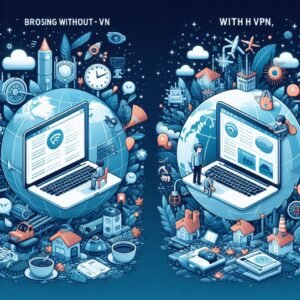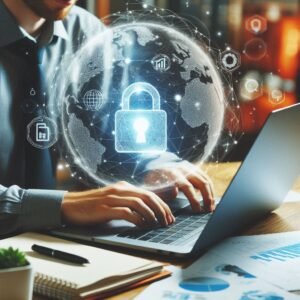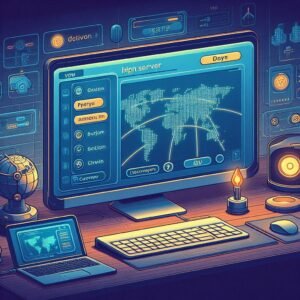What is a VPN and Why You Need It in Today’s Digital World

Introduction
In today’s connected age, almost everything we do shopping, banking, working, or even socializing—happens online. While this brings incredible convenience, it also opens up risks. Cybercriminals, advertisers, corporations, and sometimes even governments are more interested than ever in tracking what you do online. That’s where a VPN comes in. But what exactly is a VPN, and why do you need one?
This detailed guide will explain VPNs in simple terms, break down how they work, explore the benefits they provide, and help you decide whether you should be using one. By the end, you’ll not only understand what a VPN really is but also why it’s becoming as essential as locking your front door.
What is a VPN
VPN stands for Virtual Private Network. Think of it as a secure tunnel between your device (whether that’s your phone, tablet, computer, or even smart TV) and the internet. Instead of your data traveling openly across public or private networks, a VPN encrypts it and reroutes it through a secure remote server.
This way, prying eyes cannot snoop on what you’re doing online, and your real location and identity are protected.
In simpler words, when you’re connected to the internet without a VPN, it’s as if you’re standing in a glass house where anyone passing by can see inside. A VPN puts curtains around that glass house so others can’t peek in.

How Does a VPN Work
Here’s the technical side broken into digestible steps:
-
Encryption of Data – When you connect to a VPN, your internet traffic is scrambled into unreadable code. Only the VPN server has the key to decode it.
-
Tunneling Protocols – VPNs use protocols like OpenVPN, WireGuard, or IKEv2 to establish secure “tunnels” between your device and the VPN server.
-
Masking Your IP Address – Every device online has a digital address (an IP). Without a VPN, this address gives away your approximate location. With a VPN, your IP is replaced with a server’s IP from another region, making it look like you’re browsing from somewhere else.
-
Extra Security on Public Wi-Fi – When you use free Wi-Fi in a coffee shop or airport, VPN encryption shields your data from hackers lurking on the same network.

With a VPN, your IP and data stay private, unlike open browsing.
Why a VPN is Required
Now let’s get into the practical side—why you might actually need a VPN in everyday life. The reasons are growing, and they matter to both casual users and professionals alike.
1. Protects Your Online Privacy
Your browsing habits are valuable. Internet Service Providers (ISPs), advertisers, and data brokers collect details about your online life—from the websites you visit to the products you browse. A VPN hides this activity so your internet provider or anyone else cannot easily track you.
2. Keeps Your Data Safe on Public Wi-Fi
Free Wi-Fi is handy but also dangerous. Hackers often exploit unsecured networks to steal passwords or banking information. A VPN encrypts your connection, ensuring what you send and receive is unreadable even on risky networks.
3. Access to Restricted or Blocked Content
Sometimes, certain websites or services aren’t available in your country. For example, a show might be on streaming platforms abroad but not in your region. VPNs make it possible to switch your virtual location, opening up content libraries worldwide.
4. Avoids Bandwidth Throttling
Internet providers sometimes deliberately slow down your speeds if you stream or game too much. Since a VPN hides what you’re doing, your provider can’t selectively throttle those activities, and you enjoy smoother performance.
5. Essential for Remote Work and Businesses
For businesses, VPNs give employees secure access to company files and systems without exposing them to security risks. Especially in remote work cultures, VPNs act like a shield for sensitive information.
6. Safeguards Transactions and Communication
If you use online banking, shop frequently, or exchange confidential work emails, VPN encryption ensures that hackers cannot intercept crucial financial or personal data.

Common Misconceptions About VPNs
A lot of people still misunderstand VPNs, so let’s address a few common myths:
-
Myth 1: “If I don’t do anything shady, I don’t need a VPN.”
Privacy is not about hiding wrongdoing. It’s about protecting your freedom to browse without unnecessary surveillance. -
Myth 2: “VPNs slow down the internet too much.”
While older VPNs may have been slower, modern VPNs use optimized servers and protocols that minimize speed loss. Some even improve stability on throttled networks. -
Myth 3: “VPNs are complicated to use.”
Most VPN providers now have apps with one-button connections. It’s as easy as opening an app and tapping “Connect.”

Pros and Cons of Using a VPN
Like any tool, VPNs have strengths and limitations. Understanding both gives you a balanced perspective.

Benefits
-
Enhanced privacy and security.
-
Access to global content libraries.
-
Protection against hackers on insecure networks.
-
Avoid speed throttling by ISPs.
-
Safer online banking and payments.
Potential Drawbacks
-
Not all VPN providers are trustworthy (free services may sell your data).
-
Speeds can vary depending on server location.
-
Some platforms (like certain streaming services) actively block known VPN traffic.
Choosing the Right VPN
Since VPNs differ in quality, choosing the right one is crucial. Consider these factors:

-
No-log Policy – Your activity should never be recorded.
-
Strong Encryption Standards – Look for AES 256-bit encryption.
-
Speed and Server Locations – More servers in more countries give better speed and options.
-
Ease of Use – Apps for multiple platforms and intuitive designs matter.
-
Cost vs Features – Free VPNs often compromise privacy; paid ones offer reliability and better features.
-
Customer Support – Always seek brands with excellent 24/7 support.
Use Cases of VPN in Real Life

-
Students Abroad – Accessing home country streaming services while studying elsewhere.
-
Remote Workers – Securing company data while working on public networks.
-
Travelers – Making online bookings without region-based price inflation.
-
Journalists/Activists – Protecting identity when reporting on sensitive topics.
-
Everyday Streamers – Unlocking a wider variety of movies and shows.
Future of VPNs
As digital surveillance increases and businesses go global, reliance on VPNs will continue to rise. Emerging technologies are making VPNs faster, lighter, and more integrated with devices. Even browsers and operating systems are beginning to include built-in VPN options, showing how mainstream this technology is set to become.
In the future, VPNs may combine with Artificial Intelligence and blockchain to create more adaptive and tamper-proof privacy solutions.
Conclusion
In a world dominated by digital interactions, your privacy and security are more vulnerable than ever. A VPN acts as your digital shield—keeping your identity anonymous, your data safe, and your online experience free from restrictions. Whether you want to protect your bank details on public Wi-Fi, access global content, or simply browse without being tracked, a VPN is no longer just “nice to have.” It’s a modern necessity.
So the next time you log in to your bank account at an airport, stream your favorite show unavailable in your region, or simply enjoy worry-free browsing—remember, a VPN is what makes it possible.
Pingback: VPN क्या है और आज की डिजिटल दुनिया में इसकी ज़रूरत क्यों है